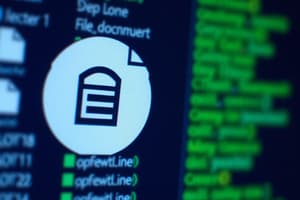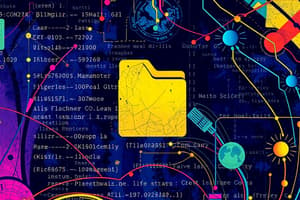Podcast
Questions and Answers
What is the primary responsibility of the operating system in process management?
What is the primary responsibility of the operating system in process management?
- Creating, deleting, and managing both user and system processes (correct)
- Providing mechanisms for file synchronization
- Creating and deleting user processes only
- Allocating and deallocating memory space
What is the main purpose of process synchronization mechanisms provided by the operating system?
What is the main purpose of process synchronization mechanisms provided by the operating system?
- To provide process communication
- To schedule processes on CPUs
- To allocate memory to processes
- To coordinate access to shared resources (correct)
What is multitasking, in the context of operating systems?
What is multitasking, in the context of operating systems?
- Running multiple processes on a single CPU (correct)
- Running a single process on multiple CPUs
- Storing data on multiple storage devices
- Executing system code only
What is the primary benefit of multiprogramming, in the context of operating systems?
What is the primary benefit of multiprogramming, in the context of operating systems?
What is the primary goal of memory management in an operating system?
What is the primary goal of memory management in an operating system?
What is the primary responsibility of the operating system in CPU scheduling?
What is the primary responsibility of the operating system in CPU scheduling?
What is resource management, in the context of operating systems?
What is resource management, in the context of operating systems?
What is the primary benefit of using multitasking and multiprogramming in an operating system?
What is the primary benefit of using multitasking and multiprogramming in an operating system?
What is the primary responsibility of the operating system in connection with file management?
What is the primary responsibility of the operating system in connection with file management?
What type of storage media is used for backing up files?
What type of storage media is used for backing up files?
What is the purpose of caching in computer systems?
What is the purpose of caching in computer systems?
What is mass storage management responsible for?
What is mass storage management responsible for?
What is the main purpose of organizing files into directories?
What is the main purpose of organizing files into directories?
What is the difference between secondary storage and slower storage?
What is the difference between secondary storage and slower storage?
What is the operating system responsible for in connection with storage allocation?
What is the operating system responsible for in connection with storage allocation?
What is an example of a slower storage device?
What is an example of a slower storage device?
What is the primary function of an operating system in managing computer resources?
What is the primary function of an operating system in managing computer resources?
What is the purpose of a bootstrap program in a computer system?
What is the purpose of a bootstrap program in a computer system?
What is the benefit of multiprogramming in a computer system?
What is the benefit of multiprogramming in a computer system?
What happens to a process in a multiprogrammed system when it needs to wait for an I/O operation to complete?
What happens to a process in a multiprogrammed system when it needs to wait for an I/O operation to complete?
What is the term for a program in execution in a multiprogrammed system?
What is the term for a program in execution in a multiprogrammed system?
What is the primary concern of an operating system in terms of I/O devices?
What is the primary concern of an operating system in terms of I/O devices?
What is the state of a system once the kernel is loaded and executing?
What is the state of a system once the kernel is loaded and executing?
What is the role of the operating system in preventing errors and improper use of the computer?
What is the role of the operating system in preventing errors and improper use of the computer?
Study Notes
Process Management
- An operating system consists of a collection of processes, including operating-system processes and user processes.
- The operating system is responsible for creating and deleting both user and system processes.
- It also schedules processes and threads on CPUs, suspends and resumes processes, and provides mechanisms for process synchronization and communication.
Memory Management
- Main memory is a large array of bytes that the CPU can address and access directly.
- The operating system keeps track of which parts of memory are currently being used and by which process.
- It allocates and deallocates memory space as needed and decides which processes and data to move into and out of memory.
File-System Management
- A file is a collection of related information defined by its creator.
- Files are normally organized into directories to make them easier to use.
- The operating system is responsible for creating and deleting files, creating and deleting directories, supporting primitives for manipulating files and directories, and mapping files onto mass storage.
Mass-Storage Management
- The operating system is responsible for mounting and unmounting, free-space management, storage allocation, disk scheduling, partitioning, and protection of secondary storage.
Cache Management
- Caching is an important principle of computer systems, where information is copied into a faster storage system (the cache) on a temporary basis.
- Cache management is an important design problem due to the limited size of caches.
- The operating system acts as the manager of cache resources, allocating them to specific programs and users.
Operating-System Operations
- A bootstrap program initializes all aspects of the system, from CPU registers to device controllers to memory contents.
- The bootstrap program must know where to locate the operating-system kernel and how to load it into memory.
- Once the kernel is loaded and executing, it can start providing services to the system and its users.
Multiprogramming and Multitasking
- Multiprogramming increases CPU utilization and keeps users satisfied by organizing programs so that the CPU always has one to execute.
- In a multiprogrammed system, a program in execution is termed a process.
- The operating system keeps several processes in memory simultaneously, picks, and begins to execute one of these processes.
Studying That Suits You
Use AI to generate personalized quizzes and flashcards to suit your learning preferences.
Related Documents
Description
This quiz covers the basics of file management, including file organization, creation, and deletion, as well as the role of the operating system in managing files and directories.




